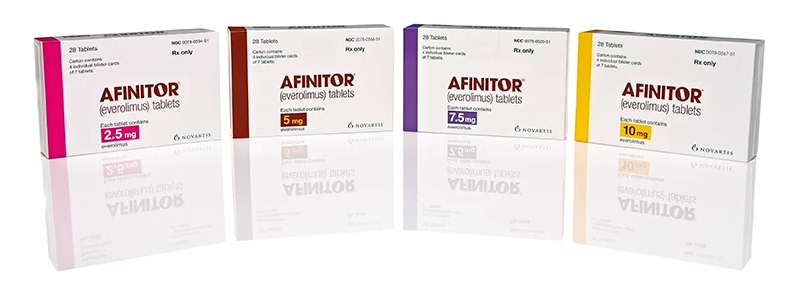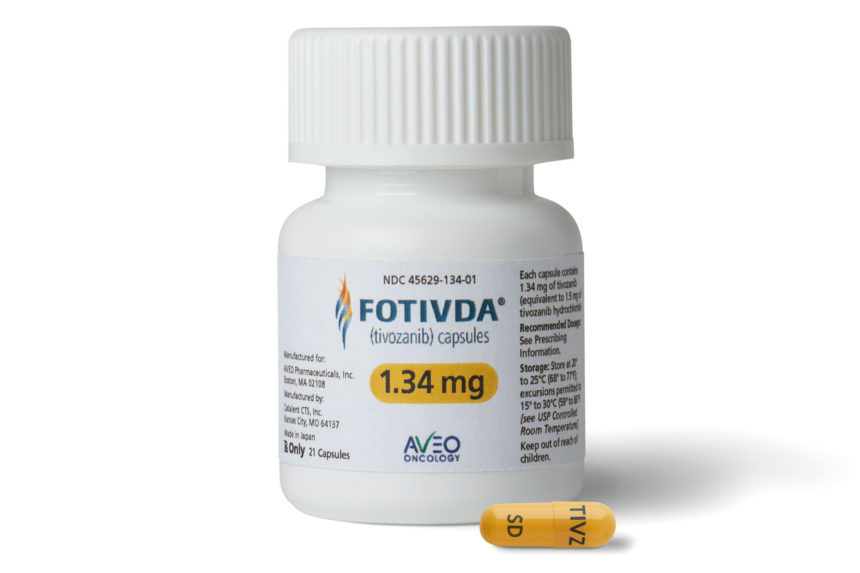Afinitor (everolimus) vs Fotivda (tivozanib)
Afinitor (everolimus) vs Fotivda (tivozanib)
Afinitor (everolimus) and Fotivda (tivozanib) are both targeted therapies used in the treatment of advanced renal cell carcinoma (RCC), but they work through different mechanisms. Afinitor is an mTOR inhibitor that works by blocking a protein that plays a role in the growth and division of cancer cells, potentially slowing the progression of the disease. Fotivda, on the other hand, is a tyrosine kinase inhibitor that targets vascular endothelial growth factor receptors (VEGFRs), which can inhibit the growth of blood vessels to the tumor, effectively starving the cancer of nutrients and oxygen. When deciding which medication is right for an individual, factors such as the specific characteristics of the cancer, previous treatments, potential side effects, and overall health must be carefully considered in consultation with a healthcare provider.
Difference between Afinitor and Fotivda
| Metric | Afinitor (everolimus) | Fotivda (tivozanib) |
|---|---|---|
| Generic name | Everolimus | Tivozanib |
| Indications | Advanced hormone receptor-positive, HER2-negative breast cancer, advanced neuroendocrine tumors, renal cell carcinoma, subependymal giant cell astrocytoma, tuberous sclerosis complex | Advanced renal cell carcinoma |
| Mechanism of action | mTOR inhibitor | VEGF receptor tyrosine kinase inhibitor |
| Brand names | Afinitor, Zortress | Fotivda |
| Administrative route | Oral | Oral |
| Side effects | Mouth ulcers, infections, rash, fatigue, diarrhea, edema, abdominal pain, nausea, fever, pneumonitis | Hypertension, fatigue, diarrhea, decreased appetite, nausea, dysphonia, hypothyroidism, cough, stomatitis |
| Contraindications | Hypersensitivity to everolimus or other rapamycin derivatives | Hypersensitivity to tivozanib or any component of the formulation |
| Drug class | mTOR inhibitor | Tyrosine kinase inhibitor |
| Manufacturer | Novartis | Aveo Pharmaceuticals |
Efficacy
Afinitor (Everolimus) for Kidney Cancer
Afinitor (everolimus) is a medication that has been approved for the treatment of advanced renal cell carcinoma (RCC), which is the most common type of kidney cancer. It is specifically indicated for patients with progressive disease after treatment with VEGF-targeted therapy. Everolimus works as an mTOR inhibitor, which is a type of protein that helps cells grow and divide. By inhibiting mTOR, Afinitor can slow down the growth of cancer cells and reduce the blood supply to the tumors, which may delay the progression of the disease.
Clinical trials have demonstrated the efficacy of Afinitor in patients with advanced RCC. The RECORD-1 (REnal Cell cancer treatment with Oral RAD001 given Daily) trial, for instance, showed that Afinitor significantly extended progression-free survival compared to placebo in patients who had previously received treatment with VEGF-targeted therapy. However, it is important to note that while Afinitor can delay disease progression, it is not a cure for kidney cancer.
Fotivda (Tivozanib) for Kidney Cancer
Fotivda (tivozanib) is another medication approved for the treatment of advanced renal cell carcinoma. Tivozanib is a tyrosine kinase inhibitor that targets VEGF receptors, which are involved in the formation of new blood vessels (angiogenesis) that tumors need to grow. By inhibiting these receptors, Fotivda can prevent the growth of new blood vessels to the tumor, thereby inhibiting tumor growth.
The efficacy of Fotivda in kidney cancer was evaluated in a pivotal Phase 3 clinical trial known as the TIVO-1 study. This trial demonstrated that tivozanib significantly improved progression-free survival compared to sorafenib, another VEGF inhibitor, in patients with advanced RCC who had not received prior treatment. The results indicated that Fotivda could be an effective first-line treatment option for patients with this disease. As with Afinitor, while Fotivda has been shown to be effective in slowing disease progression, it is not considered a curative treatment for kidney cancer.
Regulatory Agency Approvals
Afinitor
-
European Medical Agency (EMA), European Union

-
Food and Drug Administration (FDA), USA

-
Health Canada

-
Pharmaceuticals and Medical Devices Agency (PMDA), Japan

-
Therapeutic Goods Administration (TGA), Australia

Fotivda
-
European Medical Agency (EMA), European Union

-
Food and Drug Administration (FDA), USA

Access Afinitor or Fotivda today
If Afinitor or Fotivda are not approved or available in your country (e.g. due to supply issues), you can access them via Everyone.org.
How it works

Make an enquiry
Choose the medicine you want to buy, answer a couple of questions, and upload your prescription to speed things up. We’ll get back to you within 24 hours.


Make an enquiry
Choose the medicine you want to buy, answer a couple of questions, and upload your prescription to speed things up. We’ll get back to you within 24 hours.


Breeze through the paperwork
We'll guide you through the required documents for importing unapproved medicine, ensuring you have all the necessary information.


Get a personalized quote
We’ll prepare a quote for you, including medicine costs and any shipping, administrative, or import fees that may apply.


Receive your medicine
Accept the quote and we’ll handle the rest - sourcing and safely delivering your medicine.

Some text on this page has been automatically generated. Speak to your physician before you start a new treatment or medication.
Let's talk
If you have any questions, call us or send us a message through WhatsApp or email:
Contact us




